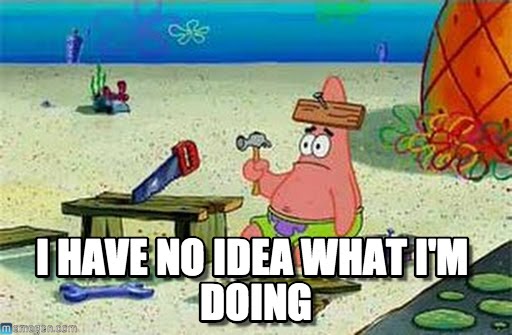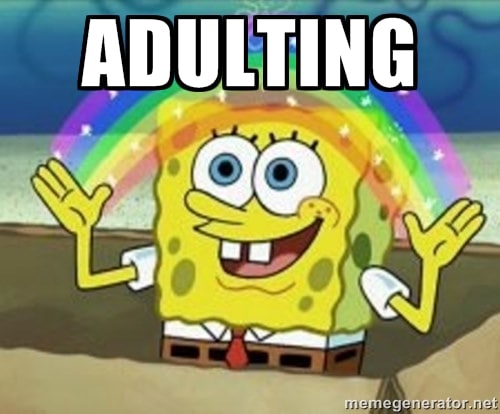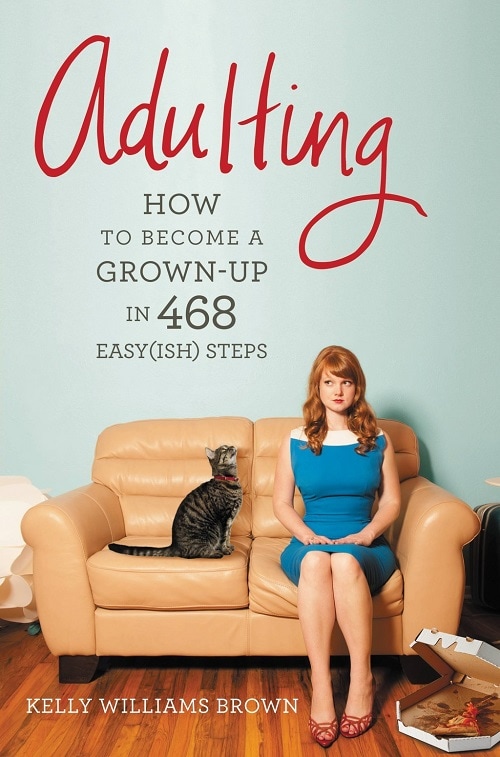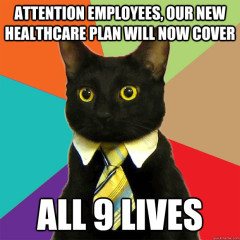
Congrats, class of 2015! You did the thing! You got the piece of paper! All your late nights, hysterical breakdowns, and manic study sessions over the last four(ish) years have finally paid off! We’re so, so, so proud of you!
When I graduated a little over a year ago, I thought I was so ready to be an adult and do adult things, like have a job, have a husband, and have responsibilities. I’ve said it before, and I will say it again, y’all: Adulthood is a trap.
Don’t get me wrong— adulthood is awesome. I love my job. I love my husband. I love my friends. No one can tell me that I can’t have whiskey and ice cream for dinner. I’m happy with my life right now. But I was so, so unprepared for a lot of the ish that went down in the last year.
In part one of this series, we talked about the weird things that may happen with your college friendships after graduation. Now, in part two, we’re going to talk about how to take care of yourself like the badass young adult lady you are, aka adulting. Read on to learn more:

Table of Contents
Required Reading
Okay, so I can’t take the credit for most of this advice, because it comes straight from Kelly Williams Brown’s Adulting: How to Become a Grown-Up in 468 Easy(ish) Steps. I cannot recommend this book enough; it has become my baby-adult bible. Whether you want to know how to cook a chicken breast, how to check your car’s oil, or what the heck an 401(k) is, Kelly Williams Brown is your adulting guru.

Seriously. Go get this book. Read it twice. Place it proudly on your bookshelf to announce to the world what a capable adult you are. Refer to it regularly, particularly when navigating the twisty and perilous worlds of healthcare, finances, and taxes. And remember:
You Are Now the Sole Person Responsible for Your Well-Being
Unless you are an absolute adulting superstar, you probably had an allowance and were on someone else’s healthcare when you were in college. Graduating and getting your own job means you’ll be responsible for your finances and, potentially, your own healthcare.
If you’ve never had to budget before or had to figure out whether a healthcare provider is in your network before, it can be really scary. At my last trip to my new dentist, I nearly had a panic attack when they asked to take x-rays of my teeth because I didn’t know if it was covered by my insurance.
It’s totally okay to feel confused and overwhelmed by this stuff, especially if this is the first time you’re doing this on your own. The good news is, you’re not alone– every feels this way, sort of, when they first start to do this stuff. Don’t beat yourself up too much; you’re learning. You’re a baby adult, taking baby adult steps. You’ll figure it out along the way, the same way everyone does. You’re doing great.
Set Your Budget

If you are living on your own, you need to know how much you’re bringing in every month so you can know how much to spend. You simply can’t spend more than you make, because that will get you into loads of debt, which is not a thing you even remotely want, so don’t do it.
When you’re trying to figure out your budget, start by writing out what you think you already spend on everything. This should not only include things like rent, utilities, and student loan payments, but also the small stuff– how much you spend on iced coffee or takeout or beauty products per month.
After that, go through your bank statement and figure out how much you really spend on that stuff. For example, I thought I was doing really well on not spending too much money on takeout and spending more money on groceries, but when I went through my bank statement, I found I was spending more than twice the amount I budgeted in takeout. Not a good look.
Then, set your budget, knowing how much you actually spend on what. It’s okay to try to incorporate goals into your budget (“I want to spend less on makeup” or “I’ll only budget $50 on going out this month”) but try to give yourself a little wiggle room, like a per diem or a set amount of “me money” each month, as well as a buffer amount in case something comes up.
If you can, also try to budget for savings. Brown says you should be able to save $10 each paycheck at the very minimum, but I think for most people $20 is doable, too. If you save $20 each paycheck, you’ll have $520 dollars in your emergency fund in a year, which should cover most small emergencies.
Feed Yourself

I know a lot of you already know how to cook, at least a little bit, but there’s a difference between cooking for yourself at college when you have tons of free time and cooking for yourself as an adult, when you have way less.
Remember that takeout budget I told you I was failing at following? I was stumbling home after work so exhausted that I didn’t want to even look at the kitchen. Thus, the copious orders of Indian food and Taco Bell. I’m still not perfect at this, but here’s what I do to keep myself from reaching for the phone when I’m starving, cranky, and exhausted:
Get thee a Crock-Pot: Crock-Pots are magical. They’re like portals to another world where you put raw food in when you leave for work and come home with chicken tikka masala or chili from another dimension. Get one, then get a Crock-Pot recipe book, or use Pinterest. Use it to make literally everything. You’re welcome.
Master the 15-minute meal: This is a meal that you would eat day-in, day-out, and can make with your eyes closed. Mine is a soba noodle bowl with green onion, frozen spinach, and a poached egg. Yours might be spaghetti with homemade pesto, or fried rice with kimchi and bacon. Find the thing, learn how to make it, and keep the ingredients on hand. This is also the perfect thing to make your hungry friends when you’re hanging out and they want to order pizza.
The freezer is your friend: My rule of thumb is that I freeze one fourth of everything I make, because I’m likely to burn out on something if I eat five servings of it in one week. This way, if I’m ever strapped for cash or too tired to cook, I can pull a mason jar of soup out of the freezer. Plus, I’m prepared for the impending zombie apocalypse. Bonus.
If you can, eat mostly vegetarian or vegan: This won’t save you time, but it will save you money and is healthier for you in the long run. And rather than attempting to replace meat in meals with meatless options (9 times out of 10, you’ll be disappointed, trust) try to seek out recipes that are meant to be vegetarian, like shakshuka or beans and rice.
Eating meat sparingly obviously isn’t bad for you, but the meat-rich western diet has been linked to obesity, heart disease, diabetes, and cancer, so it certainly can’t hurt to develop a taste for meatless meals while you’re young and it’s easier to change habits.
I would also encourage you to learn where your food comes from, and figure out whether you want to eat organic produce or not. There are a ton of food documentaries on Netflix right now, like Food, Inc., Vegucated, Forks Over Knives, and King Corn, that can teach you about the state of American agriculture and how this affects our diet, but there are also a lot of great books out there too, like Michael Pollan’s The Omnivore’s Dilemma and In Defense of Food.
Figure Out Your Healthcare

You should be going to the doctor and dentist every six months for a checkup. It’s not fun, and sometimes it’s not even pleasant, and you might have to use your lunch break or a half day to do it. But you should do it, especially if you have the healthcare.
If healthcare is as confusing and anxiety-inducing to you as it is to me, know that you have excellent resources at your disposal to help alleviate some of that confusion. These are the resources I’ve used in the past, but please keep in mind that you may not have all of these available to you, or in the same capacity:
1. Your HR department: Depending on the size of the company you work at, your HR department might have an entire team devoted to your benefits and healthcare options. See if you can make a 1-on-1 appointment to talk to them about finding healthcare providers, what sorts of procedures are and aren’t covered, and how much you’ll have to pay out of pocket for prescriptions. Ask if there are other resources you could be using, like a website or an app that tracks in-network providers. They’re there for precisely that reason– go ahead and utilize that resource, LIKE AN ADULT, YO.
2. Your healthcare providers: It is totally, totally appropriate and okay to go up to the front desk of your dentist or doctor’s office and ask if they accept X insurance or if they’re in the network for Y company. If you’re in an appointment and they suggest a procedure, feel free to ask if it’s covered by your insurance if you’re uncertain– most likely the doctor will know right off the bat, and if not, they know how to figure it out for you.
3. Your coworkers: your coworkers have the same insurance provider as you, and they’re in the same network as you – ask around to see if they have any recommendations for healthcare providers, especially if you’re new to the area. They can probably also give you an idea of what procedures are and aren’t covered by your insurance, if they’re feeling chatty.
What do you think?
What tips do you have for creating a budget, or figuring out your healthcare? What is your favorite thing to cook on a budget? What advice do you wish you’d gotten on adulting when you were younger? Let me know in the comments below!

That noodle bowl sounds great–what’s your recipe?
Pretty simple – I saute the white and light green parts of a green onion with a little bit of minced garlic in oil in a small saucepan for maybe 30 seconds, then I add one bundle of soba noodles and a handful of frozen spinach with two cups of beef or veggie broth and cook over medium heat for about four minutes. Then I turn the heat down to low, drop an egg in the broth, and cook until the noodles are done and the egg white is just set. Top with the dark green parts of the green onion and whatever else you want – avocado, edamame, toasted sesame oil, red pepper flakes, kimchi. If you’re intimidated by poaching an egg you can always sliced a hard or soft-boiled egg on top of the noodles, or add a fried egg instead.
Excellent. 🙂 Another quick cheap meal: basic channa masala! Saute chopped onion and garlic in butter or oil unti soft and browning, add a few tsps of garam masala spice mix (you can make it yourself super easily or like…Target has it I think), and then a caon of chickpeas and a can of tomatoes. Stir and cook until it thickens up and eat, on it’s own or over rice/quinoa/etc. You can throw in frozen greens too, and some sour cream or plain yogurt mixed in is also tasty. Cheap, filling, vegetarian, can be vegan easily and it’s INDIAN FOOD so you know, win. There are much better and more detailed recipes for channa masala out there, but this is sort of the most basic version I make sometimes.
Also, when it comes to meat: CHICKEN THIGHS. Throw ’em in the oven on top of some potatoes and carrots and throw some dried rosemary on the whole thing and you seem passably fancy.
This is great. I graduated a year ago (and can’t get myself to stop checking this site!) and I’m definitely going to be picking up that book! I can really identify with the find your 15-minute meal – mine is fried brown rice with chicken and frozen veggies. I also find that buying the family size of chicken breasts is great, because I cook 5 for lunch that week and freeze the rest individually so I can use them the next week. Something important I think people should know too is that carbs should not be your best friend – pasta is easy (rice too!) but stay away! I don’t like to cook my fried rice more than once a week. I eat tons of eggs, and I’m getting into fun salads with easy ingredients.
I definitely need to get my healthcare sorted out! Currently just keeping my fingers crossed I don’t have a major health problem in the next month D:
Technically any verb with the addition of “ing” is a noun… so if adult is a verb, adulting would still be a noun… (in response to the caption on your second image: “‘Adulting is a verb, not a noun,’ Spongebob reminds you.”)
Ummm… no it’s not? That is not how grammar works. Adulting would be a verb. words that end in -ing are verbs!
This may be the best post on this entire site. Thank you a million!!!